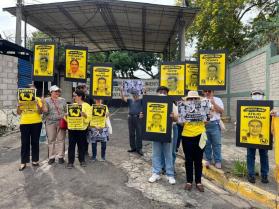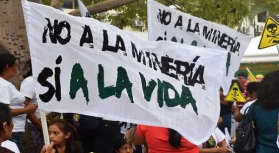Equipo Maíz Shines a Light on Bukele's "Bitter Medicine"
Each week, the historic popular education organization Equipo Maíz releases a newsletter highlighting an ongoing issue in Salvadoran society. Since Nayib Bukele took office in 2019, the newsletters have often focused on his government's attacks against public sector workers and government institutions, as well as economic indicators that demonstrate declining living standards for the country's most vulnerable sectors. Below, we offer translations of some recent newsletters (Páginas de Maíz) to help shed a light on the dire economic situation and the effects of major public sector budget cuts (translated with permission from Equipo Maiz).
2/16/24
The UES: Under Attack and Defunded
The government wastes money on propaganda and events like Miss Universe to make Bukele and his political party look good while abandoning higher education.
Abandonment of the University of El Salvador (UES)
As a presidential candidate in 2019, Bukele held a rally at the UES where he promised wonders to the student body: an increased university budget to make it the best in Central America; the construction of new campuses in La Union, Ahuachapan, and Chalatenango; new majors; technical equipment; a modernization of the UES library and clinics; the creation of the Ministry of Higher Education, Science, and Technology; etc.
Nevertheless, as president, Bukele has failed to deliver. In the 2022 budget, the government included the construction of 4 university campuses, yet none were built by the end of the year. In 2023, two campuses were included in the budget once again, neither of which was built by the end of that year. A promise to build new campuses wasn’t even included in the 2024 budget.
Not only did the Bukele government not do what they had promised, but they took resources away from the UES. The government owes the UES $48 million, money that was never disbursed from multiple budgets: $16 million from 2022, $27 million from 2023, and $5 million so far in 2024. As a result, the UES has been unable to pay $19 million to its service providers, who could take them to court, making the university’s predicament even worse.
The UES is in crisis and will have a difficult time resuming in-person classes, as they had planned, as they lack the resources to pay the electricity bill, hire professors to teach classes and offer office hours, and continue research projects. All of these problems affect the quality of the education that the 50 thousand UES students, primarily from low-income backgrounds, receive.
The Occupation of the UES
The government has abandoned higher education and does whatever it feels like with the UES. They have failed to upgrade and hand over the facilities that they used for the XXIV Central American and Caribbean Games, the VIII Central American University Games, and to house journalists that covered the Miss Universe pageant.
The UES facilities are currently being used to house Nuevas Ideas (New Ideas) party activists that participated in the rigged vote count following the February 4 elections. The party has even held political rallies at the UES.
These failures and violations carried out by the government have enjoyed the complicity of a considerable portion of the university authorities.
The day will come in which the Salvadoran youth, trying to improve their conditions through a high quality education that has been stolen from them, will reclaim the university’s autonomy and their right to higher education.
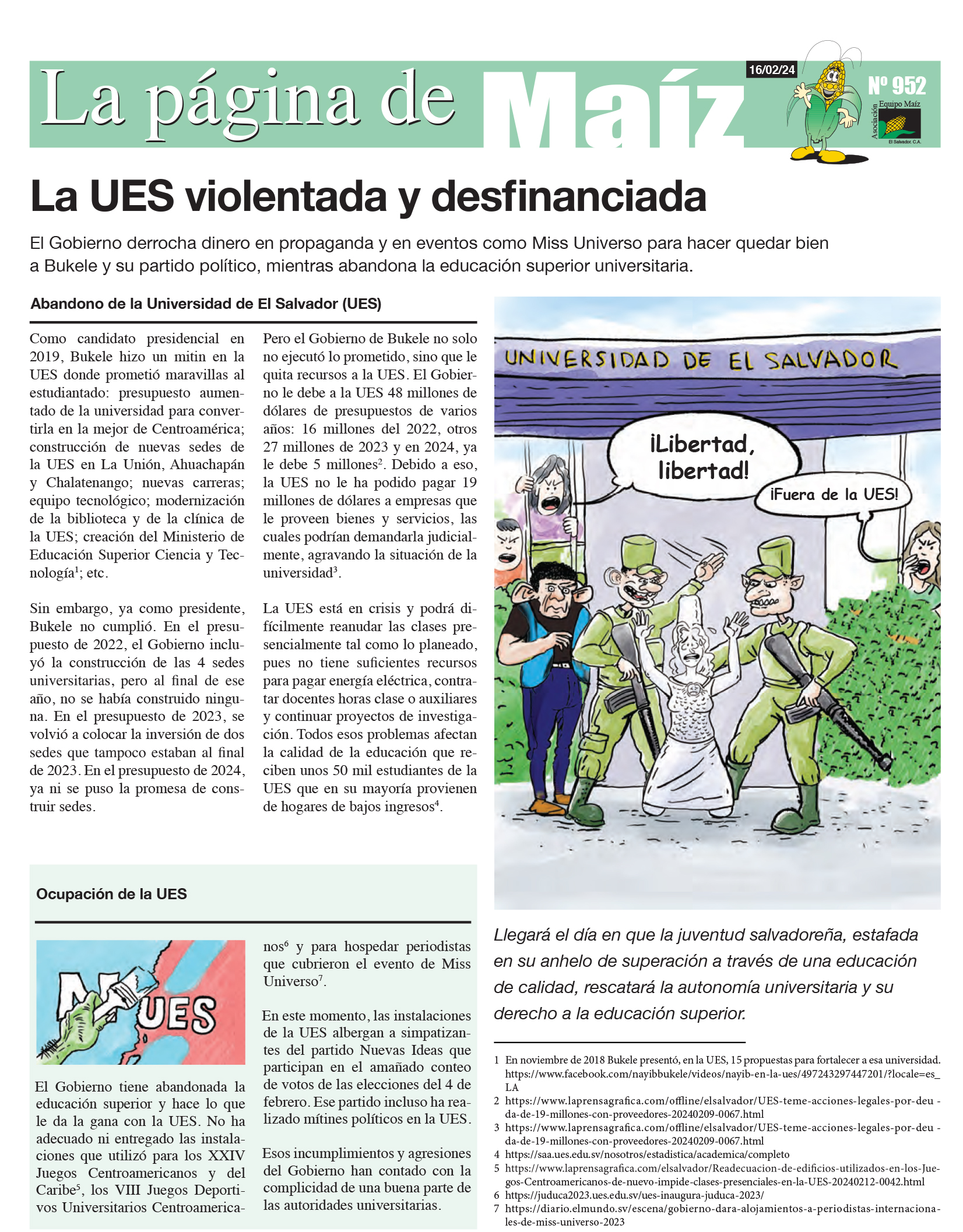
3/1/24
Following the Electoral Spectacle, the Poisoned Bitter Medicine
The electoral show is coming to an end. Bukele prevailed, in violation of the Constitution, supported by fraud in the Legislative Assembly election vote count. The ruling clan’s celebration will end and the population will continue to feel their living conditions deteriorate.
Less Production, Higher Prices, and Worse Education
1. Less food: In 2023, basic grain production went down: Rice saw a 24% drop, bean production fell 13%, and corn 7%. This year will be worse since the government cut $32 million from the Agriculture and Livestock budget.
2. Food is more expensive: Between January 2023 and January 2024, the price of basic food staples in urban areas increased from $245 to $257.
3. Gasoline is more expensive: Fuel prices have already increased 4 times, affecting the owners of the country’s 1.7 million vehicles. And since fuel is a business expense, companies will also increase their prices.
4. No increase in wages: Wages and pensions are frozen and family remittances went down $2.2 million (0.4%) in January 2024.
5. Teachers without required raises: More than 40,000 teachers demand the salary increase stipulated in the Teaching Career Law. They will not get it this year either, since the government cut salaries in the Ministry of Education’s budget.
6. Students without adequate services: 1,108,000 elementary and middle school students attend schools that are run down. And thousands of young people cannot go to the public University of El Salvador (UES) because the government owes them $48 million. The UES cannot even pay for the basic services to allow it to continue to function.
7. Layoffs in sight: Thousands of people working for municipal governments are at risk of losing their jobs with the reduction in the number of municipalities, from 262 to 44.
8. Migration continues: In 2023, 181 Salvadorans trying to enter the U.S. were captured at the country’s southern border each day.
The people will eventually be disillusioned
The majority of people who voted for Bukele are hoping that their economic situation will improve. But since the government is composed of businesspeople who accumulate wealth for themselves, the people will not benefit and will eventually give that illusion up.
Sooner or later, the people will respond and will hold the government, which has been promising them improvements that will not come, to account.
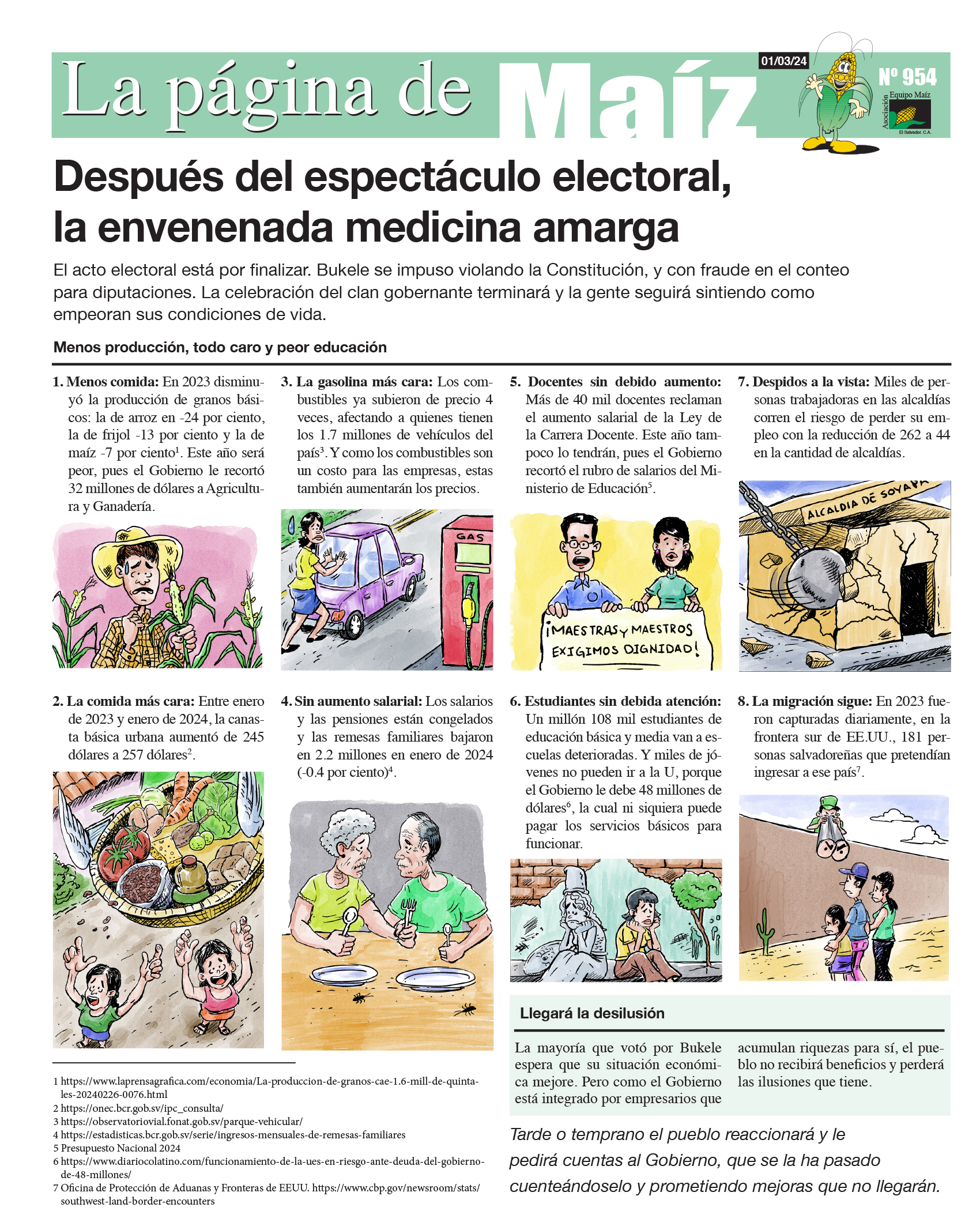
3/22/24
The Public Healthcare System is Sick
The public health system has deteriorated significantly under the current government. Preventable diseases are increasingly prevalent, there are medication shortages in hospitals, and services are generally declining.
Increase in Preventable Diseases
1. Beginning in January of this year, and rising in February, there has been a notable increase in dengue fever cases, acute respiratory infections, pneumonia, diarrhea and gastroenteritis, typhoid fever, and rashes.
2. The surge in diarrhea cases is the most serious; in the first nine weeks of the year, 83,408 people were affected, twice as many cases as were seen in the same period in 2023.
3. It is believed that the cases of diarrhea in children may be due to the low rate of vaccination against the rotavirus. In the adult population, it may also be related to bacterial or parasitic infections. In both situations, the heart of the issue is the insufficient (or total lack of) preventive measures by the healthcare system.
4. The Salvadoran Social Security Institute (ISSS) has seen an average of 2,800 daily cases or respiratory illnesses, a weekly average of 19,610 cases.
The decline in health is the government’s fault
People have identified a serious shortage of medicine for chronic (like cancer, diabetes, and others) and non-chronic illnesses. For people who have to buy medicine, the costs have skyrocketed.
The Minister of Health, Francisco Alabi, admitted that the institution that he runs has had to remove medicine that was not fit for human consumption. The minister said that they had “no ill health effects,” even though these bad medications were given to patients, including children, in 2021, 2022, and 2023.
The deterioration in the healthcare system is the government’s responsibility, especially that of the president, who spends millions of dollars on propaganda, on spectacles, on Bitcoin, and on other things that have no benefit for the population.
There is no medicine; only the bitter medicine that kills.
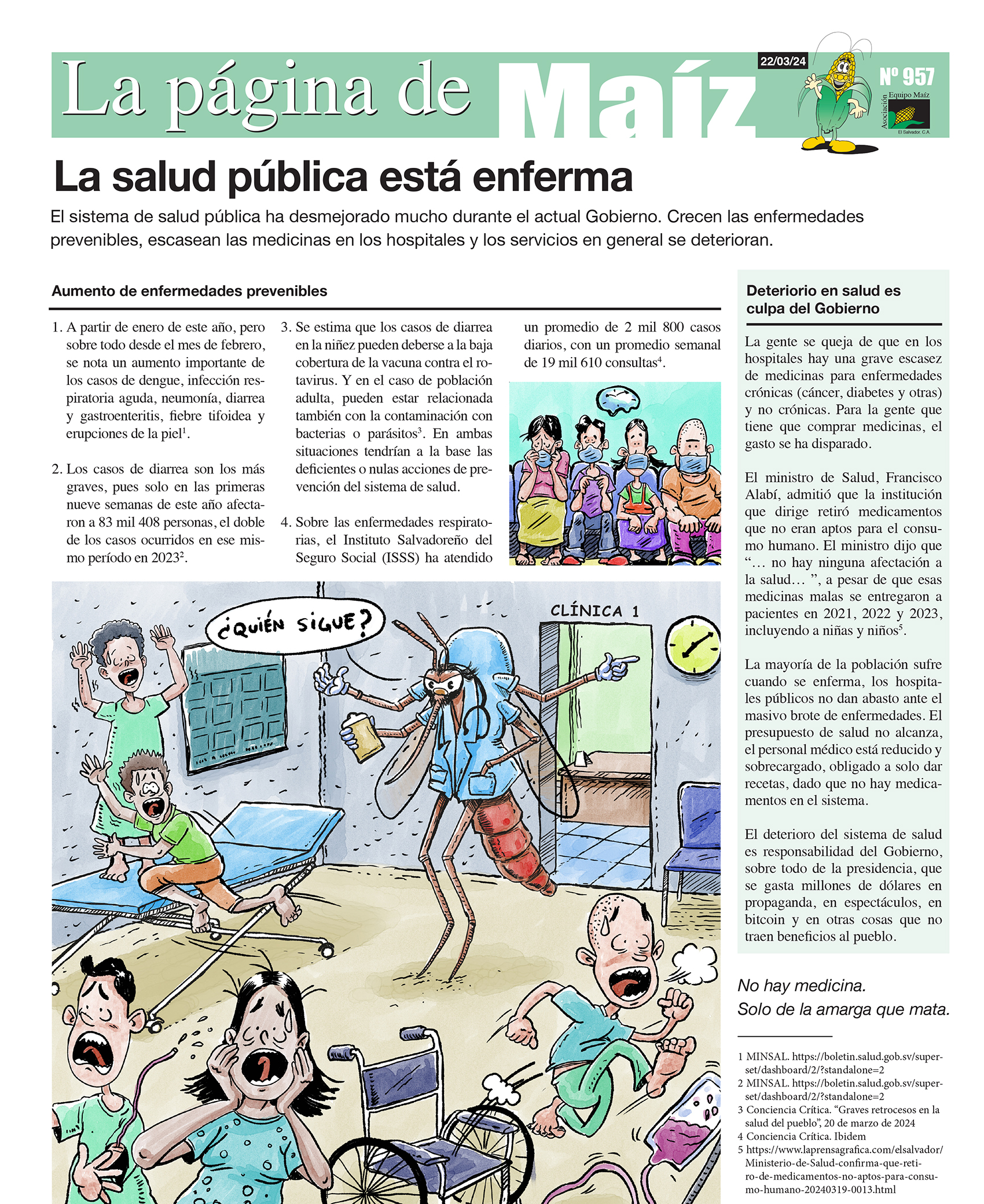
4/12/24
The Government Is Using Pension Funds Like a Piñata
The government is “borrowing” huge sums of money from the Pension Fund Administors (AFP). That money belongs to the people who work and contribute (or save) each month in order to receive a pension when they retire.
How long has this debt been outstanding?
In 2006, the Saca government passed a law that allowed them to borrow money from the AFP to pay about 90,000 pensions belonging to people whose pensions were in the Salvadoran Social Security Institute (ISSS) and the National Public Employees Pension Institute (INPEP). The institutions could not cover the pensions after going bankrupt following the privatization of the administration of these funds with the AFP.
Ever since then, governments, including Bukele’s, have borrowed money from the AFP in exchange for legal documents called Pension Investment Certificates (CIP).
But each year the governments also paid them a portion of the money. In addition, there was a cap on the maximum amount that the governments could take from the money in the AFP contribution funds. As of March 2023, the accumulated government debt was almost $8.4 billion.
The Bukele government takes more money and decides not to pay
With the 2023 pension reform, the CIP were swapped for COP (Pension Liability Certificates), the difference being that the government can now take contributions from the AFP.
In just the 11 months between April 2023 and February 2024, the Bukele government has taken almost $1.3 billion out of the AFP. This is an enormous amount of money, as paying the ISSS and INPEP pensions only requires $300 million per year.
What has the government done with the other billion dollars? What have they spent it on? The pension fund debt now stands at almost $9.8 billion. If the government continues taking money from the fund at this rate, it will soon run out and there will be no money to pay current retired people’s pensions.
But it gets worse. The Bukele government has negotiated an agreement with the AFP in which they will not pay them a single cent for four years, meaning that the debt will continue to grow and the government will not make any payments (neither on the capital nor the interest) until 2027. At that point, the debt will be enormous and it will be very difficult for the government to pay it off.
This doesn’t affect the AFP, as they charge their commission each month when they receive the workers’ pension contributions. So their profit is safe.
The government has been snatching money from the people's pension contributions like a piñata. Where is the money? There are no public works, the hospitals are out of medicine, the education system is in ruins, and the government owes the UES $52 million.
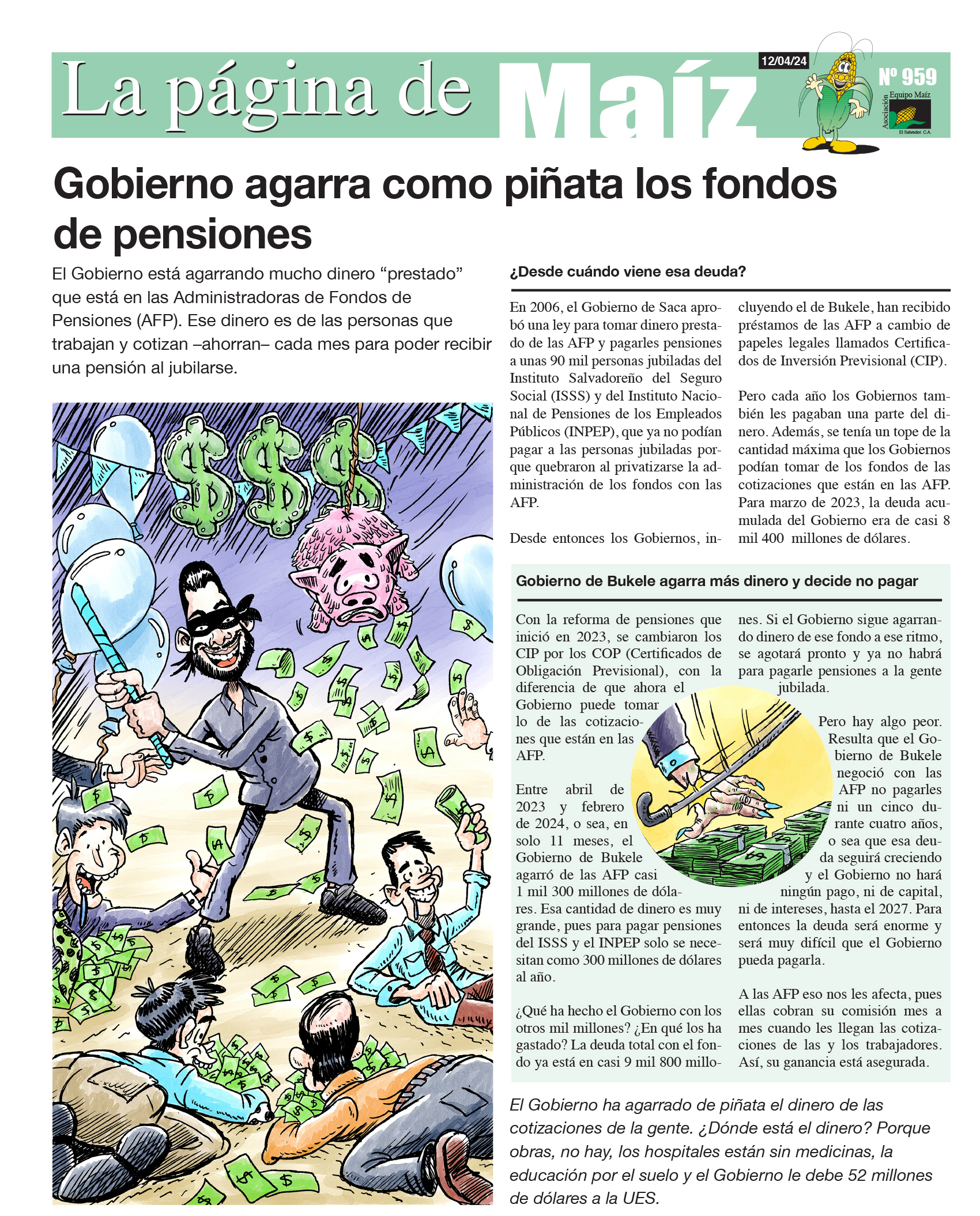

 "I am a CISPES supporter because continuing to fight for social justice and a more people-centered country means continuing the dream and sacrifice of thousands of my fellow Salvadorans who died for that vision.” - Padre Carlos, New York City
"I am a CISPES supporter because continuing to fight for social justice and a more people-centered country means continuing the dream and sacrifice of thousands of my fellow Salvadorans who died for that vision.” - Padre Carlos, New York City